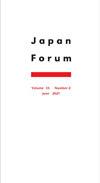COVID-19 and mandatory telework: effects on gender roles and work family conflicts among Japanese dual-career regular employees with children
IF 0.2
Q2 AREA STUDIES
引用次数: 0
Abstract
This study empirically investigates some of the consequences of mandatory telework from home brought about by the first state of emergency following the outbreak of COVID-19 in Japan. There is yet scant research in Japan on the consequences of working from home due to the COVID-19 pandemic, and this article disentangles the concepts of mandatory and involuntary telework. A survey of regular employees in dual income households with children retrospectively assessed the changes in gender role attitudes and work-family conflicts before and during forced telework from home in the Tokyo area in Spring 2020 and shed light on their first experience with telework. Mandatory telework, regardless of frequency, did not affect gender role attitudes among Japanese dual-career couples, and was associated with lower work-family conflict more so among women. Full mandatory telework resulted in higher satisfaction with one's work space at home for women, and a desire for more frequent telework among both genders, once COVID-19 is under control. These results can help individuals, firms, and governments understand the effects of mandatory telework and devise countermeasures supporting flexible work arrangements. [ FROM AUTHOR] Copyright of Japan Forum is the property of Routledge and its content may not be copied or emailed to multiple sites or posted to a listserv without the copyright holder's express written permission. However, users may print, download, or email articles for individual use. This may be abridged. No warranty is given about the accuracy of the copy. Users should refer to the original published version of the material for the full . (Copyright applies to all s.)2019冠状病毒病和强制远程办公:日本有孩子的双职工对性别角色和工作家庭冲突的影响
本研究实证调查了日本COVID-19爆发后的第一次紧急状态所带来的强制在家远程办公的一些后果。由于COVID-19大流行,日本还很少有关于在家工作的后果的研究,本文对强制和非自愿远程工作的概念进行了梳理。2020年春季,对东京地区有孩子的双收入家庭的正式员工进行了一项调查,回顾了他们在被迫在家远程办公之前和期间的性别角色态度和工作-家庭冲突的变化,并揭示了他们第一次远程办公的经历。强制远程办公,无论频率如何,都不会影响日本双职工夫妇的性别角色态度,并且在女性中与较低的工作-家庭冲突相关。全面强制远程办公导致女性对家中工作空间的满意度更高,一旦COVID-19得到控制,男女都希望更频繁地远程办公。这些结果可以帮助个人、公司和政府了解强制性远程办公的影响,并制定支持灵活工作安排的对策。日本论坛的版权是Routledge的财产,未经版权所有者的明确书面许可,其内容不得复制或通过电子邮件发送到多个网站或发布到listserv。但是,用户可以打印、下载或通过电子邮件发送文章供个人使用。这可以删节。对副本的准确性不作任何保证。用户应参阅原始出版版本的材料的完整。(版权适用于所有人。)
本文章由计算机程序翻译,如有差异,请以英文原文为准。
求助全文
约1分钟内获得全文
求助全文

 求助内容:
求助内容: 应助结果提醒方式:
应助结果提醒方式:


